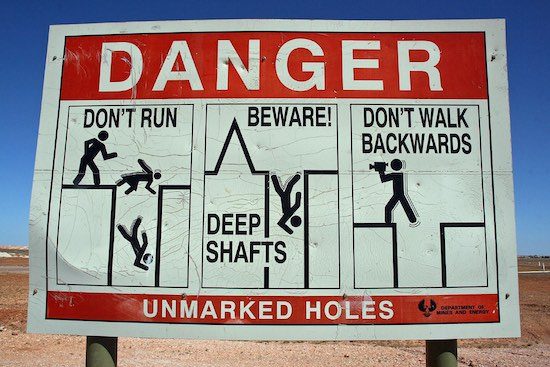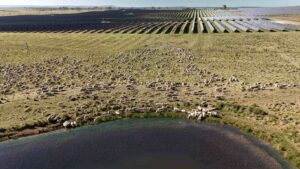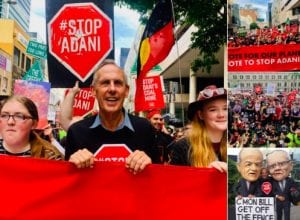Just when you thought that the public debate around clean energy in Australia could not possibly get any worse, any dumber, or any further divorced from reality, it did.
Conservatives have been railing against renewables and carbon pricing for at least a decade. So ingrained has it become in our national psyche that it is like a State of Origin contest between energy sources and their fans. “Queenslander”, shout the league fans. “Fossil fuels” screech the incumbents.
But it plumbed further depths this week. And it got really stupid and really nasty. Conservatives in the government and the media rebooted their attacks on wind and solar energy, and extended it to battery storage and vehicle emission standards, with the Murdoch media dubbing the latter as a “carbon tax on cars.”
Craig Kelly, the chair of Coalition’s energy policy committee, said renewable energy “would kill people”, a claim happily repeated by columnist Andrew Bolt.
Resources Minister Matt Canavan urged the Queensland government to “forget about climate change”, while the LNP in Queensland will this weekend consider a motion urging Australia to quit the Paris climate deal.
Worse, the conservatives started attacking individuals. The verbal assault on chief scientist Alan Finkel was launched way back in February when it was clear he would not toe the fossil fuel line. And even after delivering what many consider a “soft option”, the conservatives rekindled their attack.
“The Finkel report is a blueprint for destruction — of the Australian economy and destruction of the Liberal Party,” Murdoch columnist Piers Akerman wrote.
Then they added another target – the new head of the Australian Energy Market Operator, Audrey Zibelman. Broadcaster Alan Jones urged that “this woman”, who he accused of being a “global warming advocate and a promoter of wind turbines”, be “run out of town”.
On the same day, writing in Quadrant magazine, Alan Moran, the former head of regulation for the Institute of Public Affairs, described Zibelman as a “refugee from Hillary Clinton’s presidential defeat.” (Actually she worked for New York governor Andrew Cuomo).
“Alan Finkel’s otherworldly prognosis is bad enough. But toss in Malcolm Turnbull’s advocacy of renewables and then add an imported American chief regulator who would have been happier working for Hillary Clinton and where are you? The simple answer: thoroughly stuffed,” Moran wrote.
These attacks on Finkel, and now Zibelman, come in groups. It begs the question, are they co-ordinated? And if so, by whom?
But really, how did Australia get this stupid? And this ugly?
South Australia’s energy minister Tom Koutsantonis thinks it’s because the conservatives, or at least the Coalition, are in the pockets of the fossil fuel lobby.
“The only thing standing in the way of lower prices, improved grid security and meeting our carbon reduction commitments is a divided federal Liberal Party that is completely beholden to the coal lobby,” Koutsantonis said on Thursday.
He may have a point, because ideology alone does not explain the absurdity and ignorance of some of the remarks made this past week.
 It seems there is nothing about the clean energy economy that these people like. The conservatives and the Murdoch camp has been relentless against wind farms for years now and this week they turned its target to battery storage and solar panels.
It seems there is nothing about the clean energy economy that these people like. The conservatives and the Murdoch camp has been relentless against wind farms for years now and this week they turned its target to battery storage and solar panels.
One story focused on fires from solar panels, claiming 40 such fires occurred over the last five years in Victoria.
Context: Victoria has around 3,000 house fires a year, mostly from heaters and clothes dryers and electric blankets. Fridges cause one fire a week in London, including the recent tragedy at Grenfell Tower in North Kensington that claimed 80 lives.
The Murdoch media’s campaign against Elon Musk’s “bulldust boutique batteries” was actually kick-started by energy minister Josh Frydenberg, who made some ridiculous remarks about how a single battery could not power the whole state, or store its entire wind output.
(But it was 20 times bigger than the 5MW battery storage “virtual power plant” he was hailing earlier in the year).
No one is suggesting that this battery storage array can provide all of the state’s power needs: It is designed to help make up any energy shortfall, which occurred last year when the biggest gas plants sat idle, or when they unexpectedly tripped, and to help ride through network faults and generator failures.
And battery storage would have prevented, or at least reduced, all three major outages that occurred in South Australia since November 2015. It would certainly be smarter and quicker than the dumb, slow responding fossil fuel generator that did the wrong thing and extended the blackout on that day last November.
Battery storage is a threat to the incumbents, and their defenders, because it and other storage will make wind and solar dispatchable, will make more expensive gas peaking plant redundant, and eventually – with the addition of pumped hydro and solar thermal – allow the coal fleet to be entirely replaced.
The attack on proposed vehicle emissions standards was extraordinary. Australia has become a dumping ground for inefficient and polluting vehicles because of its absence of any such standards.
That is causing health issues and higher prices (it means more fuel consumption), but the Murdoch media had no hesitation in calling it a “carbon tax” on cars, and epithet that even Fairfax used to lead its coverage.
“Hands off our cars, warmists,” warned Andrew Bolt in the Herald Sun, echoing the extraordinary push back by conservatives against the idea of autonomous driving. “Don’t try and steal my pick-up, I’ve got a gun.”
One wonders: Do any of these people use modern technologies? Or are they still riding a horse and cart, sending telegrams and listening to the wireless, storing their beers in an ice box.
Of course, the clean energy industry doesn’t help itself – either too brow-beaten by the media or scared to offend the government. When I started writing about clean energy a decade ago, I was astonished by the circular nature of the mutual put-downs from the wind, solar, geothermal and biomass industries.
Last week, when the Murdoch media got their “scoop” on an issue well reported in RenewEconomy, the draft standards that may effectively ban lithium-ion batteries from the inside of homes, and bring a halt to the nascent household battery storage industry – a major threat to incumbent utilities.
The response from some of Australia’s leading battery storage developers? The promoters of vanadium and zinc bromine flow batteries hopped on to their soap-box and crowed about how their product was not affected.
No sense of a common purpose there. Sauve qui peux! Every man for themselves. The story of Australia’s energy industry.
Meanwhile, the fossil fuel push continues unrelenting. The Minerals Council producing yet another report claiming that “High efficiency, low emissions” coal plants could meet climate targets. To understand how preposterous that claim is, read this.
“Low emissions” is just another marketing lie. “High emissions, low efficiency” might be a more accurate description of HELE coal plants compared to the alternative smart technologies.
It is an absurd situation we find ourselves in. The public support for these new technologies is overwhelming, as it is in business (apart from those seeking to protect stranded assets), and among most politicians – even many in the Liberal Party, as NSW energy minister Don Harwin revealed late last month.
Yet here we are: Short-term policies; a patchwork of rules on energy efficiency; the worst building stock in the world; the most inefficient and polluting cars; and the world’s most expensive and dirty grid, soaring emissions, and rising temperatures.
And two years after obtaining power, prime minister Malcolm Turnbull is still defending policies he once describes as “bullshit,” too afraid to call out the nonsense spread by those keeping him in power.







